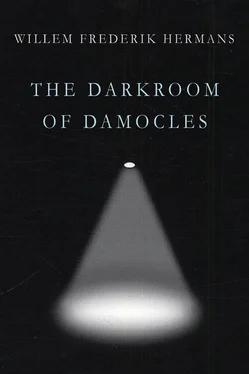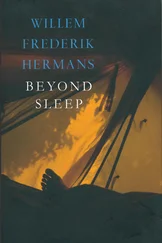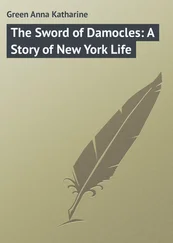‘He’s lying.’
‘Well now, aren’t you getting rather carried away? Why would a senior Railways official lie about something like that?’
‘Why wouldn’t he? What I’ve told you is the truth.’
‘Telling the truth is one thing, establishing it quite another.’
‘I told Captain Slum all about the set of photos, too.’
‘Of course you did. Have you got that, Percy?’
‘Most certainly, sir.’
He tapped a few keys with one finger.
‘Thank you.’
At this point Colonel Smears had a coughing fit. His right hand, with the cigarette stub pinched between four fingers and thumb, rested on the desktop while his left was clapped limply to his mouth.
‘You are the highest authority to have interrogated me,’ said Osewoudt. ‘I am entirely innocent. I am merely trying to answer your questions as fully as I can. For my own sake.’
The colonel cleared his throat noisily, leaned back in his chair and wiped his moustache with a large white handkerchief, which he inspected closely after each wipe.
‘Well now, this uncle of yours. Where is he?’
‘He was arrested by the Germans.’
‘What, him too? Along with Elly Sprenkel?’
‘No, a short while later.’
‘And where is he now?’
‘How should I know? He’s dead, probably, or he may still be stuck in Germany somewhere. You are in a position to track him down, not me.’
‘There’s a limit to what we can do. We’re up to our ears as it is.’
‘Then why don’t you summon Dorbeck? I’ve told you people umpteen times that he knows exactly how it all went, that it was Elly Berkelbach Sprenkel who contacted me and not the other way round. She had a photo with her which she’d been given in England, it was a picture which Dorbeck had asked me to develop and which I had sent off in the post a few days before, to an address given to me by Dorbeck.’
‘Summoning the supposed Dorbeck would not be as simple as it sounds.’
‘Why not?’
‘According to what you have told me, Dorbeck was working for one of our organisations. If that was indeed the case it probably still is. So I would have to obtain permission from his immediate superior to hear what he has to say.’
‘Well, why don’t you, then?’
‘It is impossible. If my theory is right, Dorbeck’s chief would be bound by the Official Secrets Act. Meaning he would be under no obligation to provide information about the people he employs.’
‘So what are you going to do?’
‘Well. It is a little difficult to say. I have the impression, though no more than an impression, that your compatriots also have certain matters they wish to discuss with you.’
‘It’s no good discussing with me. Everything I did was according to instructions from Dorbeck. It was Dorbeck who got me out of German detention. Why would he have done that if I was the kind of traitor you take me for? When Dorbeck rescued me, my photo and description had been circulating for months, both in the liberated zone and among the Allied forces.’
‘Even that is not as contradictory as you might think. It is conceivable that you were not so much a prisoner of the Germans as their protégé . It is likewise conceivable that Dorbeck got you out of that protective environment to make sure you wouldn’t escape justice!’
‘But in that case he could have shot me there and then.’
‘Now, now, you’re getting carried away again!’
‘He was the one who gave me a disguise. A nurse’s uniform.’
‘How charming. Got that, Percy?’
When Osewoudt was taken back to his cell, the warder handed him a parcel that had already been opened. He couldn’t discover who had sent it. It contained a small loaf of Dutch gingerbread. He took a bite and his teeth hit on something hard. What was it? A bit of wire? No, a fretsaw. He pulled it from the loaf.
He had often heard and read about various kinds of implements being smuggled into prisons so that inmates can escape by sawing through thick iron bars or making holes in ceilings. He looked around the cell: the walls were made of granite blocks, which were so big that it would be impossible for a single man to dislodge them, even if they hadn’t been cemented. He looked at the window: it was barred inside and out, and moreover far too high up.
He bent the saw double and used it to pick the wax from his ears.
The warder who brought him his rations spotted the saw, said nothing, and didn’t bother to confiscate it.
Osewoudt asked for a pen and paper and was given one folio sheet and a biro.
Nevergold Prison, Manchester
29 June, 1945
Your Majesty!
For the last time I seek to draw your attention to the fact that I have been kept a prisoner without cause since my arrival here over two and a half months ago. This treatment is wholly uncalled for, indeed mistreatment would be a better word.
On 5 April of this year I escaped from German captivity with the help of a secret agent by the name of Dorbeck. This British agent provided me with a nurse’s uniform to disguise my identity. On 6 April I travelled in disguise from Amsterdam to Dordrecht, where I appealed to the priest of the Church of St Ignatius for help. This priest gave me shelter for one day. On the night of 7 April I was fetched by members of the Dutch Resistance and taken to Willemsdorp. From there other people, whose names I do not know, took me across the Hollands Diep in a rowing boat, then left me with a doctor by the name of Sikkens in Hogezwaluwe. Upon my arrival there at 4 a.m. the doctor offered me a bite to eat and a few hours later drove me in his car to Breda, where I reported to the army headquarters at the Graaf Adolf barracks. I was taken into custody at once. Believing this to be a normal security measure, I hardly protested against my arrest. That same night I was put on a plane to England. On that flight I learned that my picture and description had been circulating in the liberated zone for several months, and that I was a wanted man. The only possible explanation for this is that the Gestapo had put some trumped-up information into the hands of the Allied intelligence services in order to arouse suspicion against me.
That, at any rate, was what I thought initially, given that the Germans in the occupied zone had already issued a warrant for my arrest in 1944, at which time the cinema newsreels showed my picture along with my personal details, accusing me of robbery with assault.
It comes as a great shock to learn that certain people in the Netherlands have been making damaging statements about me which are based on nothing but lies and distortions of the truth.
I believe it is my given right to be heard by the Dutch authorities regarding these matters. In 1940, after the German invasion, I put myself at the service of the nation entirely voluntarily. Relying on the competence of a Dutch military cadre, I blindly carried out the instructions and orders issued to me by Dorbeck, who was an officer in the Dutch army. Many of my associates and friends, my mother, my uncle and my fiancée, have been murdered by the Germans. This might not have happened had I, like so many Dutchmen, stayed on the sidelines.
I am well aware that I was only a small cog in a much larger wheel. Finding myself in a situation where I am unable to make this understood to those interrogating me is causing me great anguish. The exact course of events is not known to me, and never was. It is Dorbeck who has the information, but it seems he cannot be found. The British Secret Service refuses to disclose his whereabouts …
A week later, the warder showed a gentleman with a black briefcase into his cell. The warder left the door open.
‘I have come from the Netherlands Embassy in London in connection with the letter you wrote to the queen.’
Читать дальше












